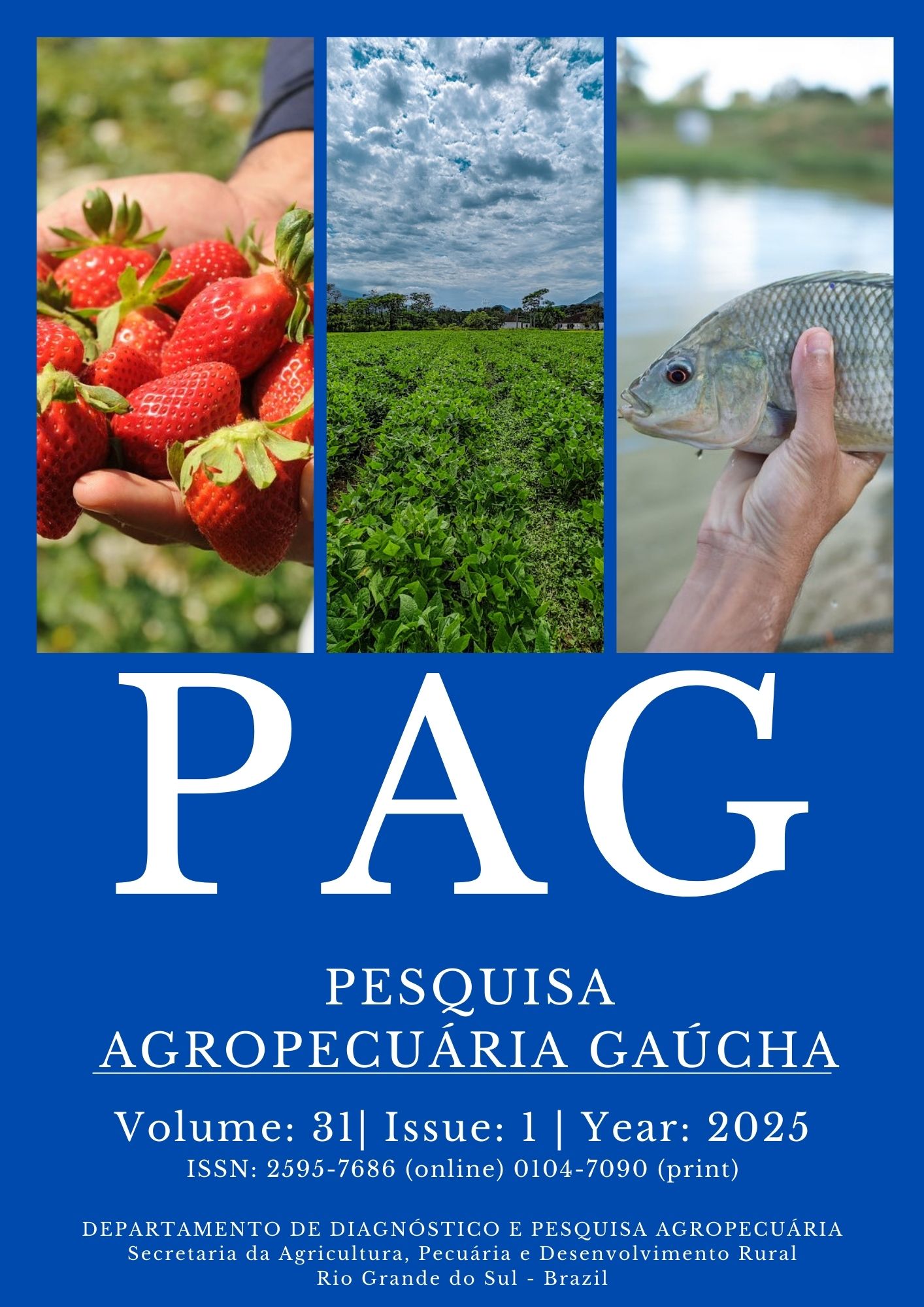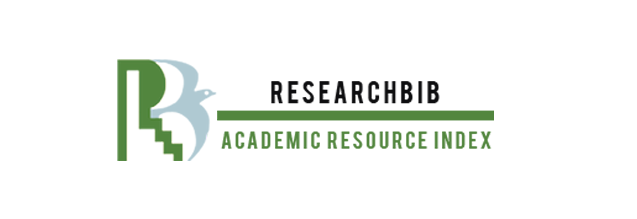Commercialization of hormonal herbicides and proposal for a risk analysis of their use in municipalities in the Rio Grande do Sul State, Brazil
DOI:
https://doi.org/10.36812/pag.202531114-26Keywords:
Pesticides, Drift, Risk matrix, 2,4DAbstract
Analysis of the trade of hormonal herbicides in cities in Rio Grande do Sul provides important guidance for regulatory and educational actions. The aim of this study was to carry out a diagnositic of commercialization in municipalities in the Campanha Gaúcha region and to propose a Risk Matrix for the use of hormonal pesticides. Data was extracted from the Integrated Agrotoxics Management System (SIGA-SEAPI RS) using the COGNOS system. The data was collected for the cities of Bagé, Candiota, Caçapava do Sul, Dom Pedrito, Hulha Negra and Lavras do Sul. Data regarding the quantities of products marketed, active ingredients, cities of purchase, and compliance with current legislation was extracted. A Risk Matrix for the use of hormonal herbicides was proposed. A total of 1,098 hormonal pesticides were purchased across the cities analyzed, with 2.4-D the most widely marketed active ingredient. Most of the sales took place in Dom Pedrito. Considering sales, 60 % were not in accordance with legislation. The elaboration of a Risk Matrix concerning the legislation on hormonal pesticides for the development of education and inspection actions resulted in the identification of 36 high-risk producers/rural establishments.
Downloads
References
BUSI, R. et al. Weed resistance to synthetic auxin herbicides. Pest Management Science, v. 74, n. 10, p. 2265-2276, 2018. https://doi.org/10.1002/ps.4823. DOI: https://doi.org/10.1002/ps.4823
BRASIL. Ministério da Saúde. Secretaria de Vigilância em Saúde. Departamento de Vigilância em Saúde Ambiental e Saúde do Trabalhador. Agrotóxicos na ótica do Sistema Único de Saúde. Brasília: Ministério da Saúde, 2018. v. 1, t. 2. Available from: https://bvsms.saude.gov.br/bvs/publicacoes/relatorio_nacional_vigilancia_populacoes_expostas_agrotoxicos.pdf. Accessed: Feb. 9, 2024.
BRASIL. Ministério da Agricultura e Pecuária. Agropecuária brasileira em números. Brasília, DF: Ministério da Agricultura e Pecuária, 2020. Available from: https://www.gov.br/agricultura/pt-br/assuntos/politica-agricola/todas-publicacoes-de-politica-agricola/agropecuaria-brasileira-em-numeros/agropecuaria-brasileira-em-numeros-abril-de-2020. Accessed: Mar. 10, 2024.
BROCHADO, M. G. S. et al. Impacts of dicamba and 2,4-D drift on ‘Ponkan’ mandarin seedlings, soil microbiota and Amaranthus retroflexus. Journal of Hazardous Materials Advances, v. 6, n. 100084, 2022. https://doi.org/10.1016/j.hazadv.2022.100084. DOI: https://doi.org/10.1016/j.hazadv.2022.100084
FERREIRA, P. H. U.; FERREIRA, M. C. Cuidados necessários para evitar problemas de deriva e volatilização. Revista Cultivar, 2020. Available from: https://revistacultivar.com.br/noticias/cuidados-necessarios-para-evitar-problemas-de-deriva-e-volatilizacao. Accessed: Mar. 3, 2024.
FREISTHLER, M. S. et al. Association between increasing agricultural use of 2,4-D and population biomarkers of exposure: findings from the National Health and Nutrition Examination Survey, 2001-2014. Environmental Health, v. 21, n. 23, p. 1-11, 2022. https://doi.org/10.1186/s12940-021-00815-x. DOI: https://doi.org/10.1186/s12940-021-00815-x
GIANESSI, L. P. The increasing importance of herbicides in worldwide crop production, Pest Management Science, v. 69, n. 10, p. 1099-1105, 2013. https://doi.org/10.1002/ps.3598. DOI: https://doi.org/10.1002/ps.3598
HARING, S. C. et al. Grapevine Injury and Fruit Yield Response to Simulated Auxin Herbicide Drift, HortScience, v. 57, n. 3, p. 384-388, 2022. https://doi.org/10.21273/HORTSCI16317-21. DOI: https://doi.org/10.21273/HORTSCI16317-21
HUPFFER, H. M.; FIGUEIREDO, J. A. S.; WEYERMÜLLER, A. R. Conflict and construction of risks in the complex and globalized society: the case of 2.4-D herbicide drift. Revista de Direito Brasileira, Florianópolis, v. 25, n. 10, p. 120-141, 2020. https://doi.org/10.26668/indexlawjournals/2358-1352/2020.v25i10.5697. DOI: https://doi.org/10.26668/IndexLawJournals/2358-1352/2020.v25i10.5697
ISLAM, F. et al. Potential impact of the herbicide 2,4-dichlorophenoxyacetic acid on human and ecosystems. Environment International, v. 111, p. 332-351, 2018.
https://doi.org/10.1016/j.envint.2017.10.020. DOI: https://doi.org/10.1016/j.envint.2017.10.020
JOHNSON, N. et al. The consequences of synthetic auxin herbicide on plant–herbivore interactions. Trends in Plant Science, v. 28, n. 7, p. 765-775, 2023. https://doi.org/10.1016/j.tplants.2023.02.003. DOI: https://doi.org/10.1016/j.tplants.2023.02.003
MARPLE, M. E. et al. Cotton response to simulated drift of seven hormonal-type herbicides. Weed Technology, v. 21, n. 4, p. 987-992, 2007. https://doi.org/10.1614/WT-07-010.1. DOI: https://doi.org/10.1614/WT-07-010.1
MÜLLER, G. C. K.; TAVARES, L. B. B. Knowledge on safe use of pesticides by tobacco growers from Chapadão do Lageado (SC). Revista Gestão & Sustentabilidade Ambiental, Florianópolis, v. 9, n. esp., p. 419-435, 2020. http://dx.doi.org/10.19177/rgsa.v9e02020419-435. DOI: https://doi.org/10.19177/rgsa.v9e02020419-435
PELAEZ, V. et al. The dynamics of international pesticide trade. Revista de Política Agrícola. Brasília, DF, v. 25, n. 2, p. 39-52, 2016. Available from: https://www.cabidigitallibrary.org/doi/full/10.5555/20163393323. Accessed: Accessed: Feb. 12, 2024.
RITTER, J. G.; SILVA, F. F. da; RUSSINI, A. Inspections actions and appropriate use of pesticides by farmers in west frontier region, Rio Grande do Sul. Tecno-Lógica, Santa Cruz do Sul, v. 22, n. 1, p. 50-57, 2018. https://doi.org/10.17058/tecnolog.v22i1.10437. DOI: https://doi.org/10.17058/tecnolog.v22i1.10437
ROCHA, R. R. O.; ALVAREZ, V. M. P. Environmental inspection of pesticides in Brazil. Ambiente & Sociedade, São Paulo, v. 26, p. 1-22, 2023. https://doi.org/10.1590/1809-4422asoc20210201r2vu2023L1AO. DOI: https://doi.org/10.1590/1809-4422asoc20210201r2vu2023l1oa
SANTOS, T. T. de L. dos et al. The danger may be in us mesa, pesticides and health problems: a review. Brazilian Journal of Implantology and Health Sciences, v. 6, n. 1, p. 1045-1058, 2024. https://doi.org/10.36557/2674-8169.2024v6n1p1045-1058. DOI: https://doi.org/10.36557/2674-8169.2024v6n1p1045-1058
SEAPDR. Secretaria da Agricultura, Pecuária e Desenvolvimento Rural. Instrução normativa SEAPDR n° 05/2019. Estabelece o “Termo de Conhecimento de Risco e de Responsabilidade”. Secretaria da Agricultura, Pecuária, Produção Sustentável e Irrigação, 2019a. Available from: https://www.agricultura.rs.gov.br/upload/arquivos/201907/05160456-instrucao-normativa-seapdr.pdf. Accessed: Accessed: Dec. 3, 2023.
SEAPDR. Secretaria da Agricultura, Pecuária e Desenvolvimento Rural. Instrução normativa SEAPDR n° 08/2019. Estabelece o regramento do cadastro das propriedades agrícolas e seus produtores rurais de cultivos sensíveis. Secretaria da Agricultura, Pecuária, Produção Sustentável e Irrigação, 2019b. Available from: https://www.agricultura.rs.gov.br/upload/arquivos/201910/03163150-instrucao-normativa-seapdr-8.pdf. Accessed: Dec. 3, 2023.
SEAPDR. Secretaria da Agricultura, Pecuária e Desenvolvimento Rural. Instrução normativa SEAPDR n° 11/2020. Estrutura e organiza o serviço de defesa agropecuária do Estado do Rio Grande do Sul. Secretaria da Agricultura, Pecuária e Desenvolvimento Rural. 2020.
SEAPDR. Secretaria da Agricultura, Pecuária e Desenvolvimento Rural. Instrução normativa SEAPDR n° 12/2022. Regulamenta a venda orientada de agrotóxicos hormonais e dá outras providências. Porto Alegre: Secretaria da Agricultura, Pecuária, Produção Sustentável e Irrigação, 2022a. Available from: 22104206-ins-12-e-13-de-15-de-setembro-de-2022-compiladas.pdf. Accessed: Nov. 17, 2023.
SEAPDR. Secretaria da Agricultura, Pecuária e Desenvolvimento Rural. Instrução normativa SEAPDR n° 13/2022. Regulamenta o cadastro de aplicadores de produtos agrotóxicos hormonais, sua aplicação e dá outras providências. Secretaria da Agricultura, Pecuária, Produção Sustentável e Irrigação, 2022b. Available from: https://www.agricultura.rs.gov.br/upload/arquivos/202209/16142253-ins-12-e-13-2022-compiladas.pdf. Accessed: Dec. 1, 2023.
SPMDR. Secretaria do Planejamento, Mobilidade e Desenvolvimento Regional do Rio Grande do Sul. Perfil Socioeconômico: COREDE Campanha. Porto Alegre: Secretaria do Planejamento, Mobilidade e Desenvolvimento Regional, 2015. Available from: https://planejamento.rs.gov.br/upload/arquivos/201512/15134128-20151117100501perfis-regionais-2015-campanha.pdf. Accessed: Dec. 2, 2023.
SONG, Y. Insight into the mode of action of 2,4-dichlorophenoxyacetic acid (2,4-D) as an herbicide. Journal of Integrative Plant Biology, v. 56, n. 2, p. 106-113, 2014. https://doi.org/10.1111/jipb.12131. DOI: https://doi.org/10.1111/jipb.12131
SOUZA, L. A.; CUNHA, J. P. A. R.; PAVANIN, L. A. Efficacy and Loss of 2,4-D Amine Herbicide Applied at Different Spray Volumes and Nozzles. Planta Daninha, Viçosa, MG, v. 29, n. esp., p. 1149-1156, 2011. https://doi.org/10.1590/S0100-83582011000500023. DOI: https://doi.org/10.1590/S0100-83582011000500023
TINOCO, T. J.; SILVA, P. L.; ROCHA, A. P. S. Integrated pest and disease management in agricultural systems. Contemporary Journal. v. 3, n. 11, p. 22675-22697, 2023. https://doi.org/10.56083/RCV3N11-135. DOI: https://doi.org/10.56083/RCV3N11-135
Downloads
Published
How to Cite
Issue
Section
License
The authors declare that the work has not been previously published, nor sent simultaneously for publication in another journal and that they agree with the submission, content and transfer of the publication rights of the article in question to the scientific journal Pesquisa Agropecuária Gaúcha - PAG. The authors assume full responsibility for the originality of the article, and may incur on them any charges arising from claims by third parties in relation to the authorship of the article. The full reproduction of the journal's articles in other free-to-use electronic media is permitted under the Creative Commons Attribution-NonCommercial-ShareAlike 4.0 International license.























